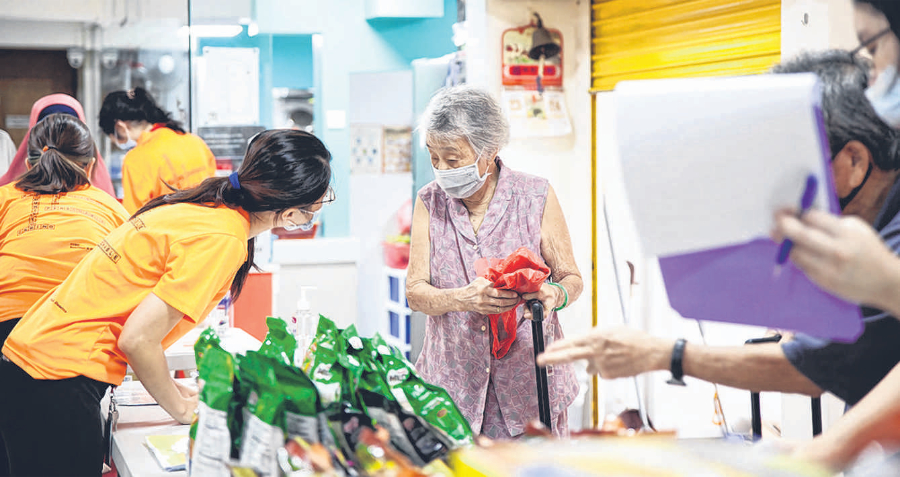 Tan Tock Seng Hospital dietitians distributing food rations to older residents in Toa Payoh. Older adults who are malnourished are more vulnerable to illnesses. PHOTO: TAN TOCK SENG HOSPITAL
Tan Tock Seng Hospital dietitians distributing food rations to older residents in Toa Payoh. Older adults who are malnourished are more vulnerable to illnesses. PHOTO: TAN TOCK SENG HOSPITAL
The Straits Times (15 September 2021)
After being hospitalised for a fall, Mr Lim Ngak Boon, 82, who used to weigh about 50kg, lost almost 10kg because the bland hospital food did not suit his palate. He is back to a healthier 48kg now after a community dietitian from Tan Tock Seng Hospital (TTSH) helped him devise a healthy food plan.
Mr Lim was initially reluctant to stick to the plan, but began taking milk supplements “because those were appetising and easier to consume”.
Age-related changes to taste buds can lead to older people having decreased appetite and taking in insufficient nutrition, which in turn puts them at risk of serious health problems.
To reduce the risk of elderly malnutrition, TTSH is rolling out a community care model in which the hospital’s dietitians work with community partners to provide dietary counselling and support to older people who are at risk.
From July to December last year, the hospital’s nutrition and dietetics department worked with nonprofit organisation Care Corner’s senior activity centres in Toa Payoh to identify residents who were socially isolated and needed nutrition support. TTSH also partnered non-profit organisation Touch Community Services to support homecare nurses who needed support with their patients’ nutrition.
These community partners coaxed older residents to work with the dietitian and monitored their progress with the recommended nutritional plans.
TTSH also held training workshops for community partners on how to identify, prevent and manage malnutrition. The hospital aims to expand the community care model to other areas in central Singapore, such as Ang Mo Kio and Kallang, from the end of this year, and train more community partners.
A significant number of older people in Singapore are at risk of malnutrition. Dr Lim Yen Peng, head and senior principal dietitian at TTSH’s department of nutrition and dietetics, cites a study conducted by the National Healthcare Group from 2015 to 2016, which found that about 14 per cent of older adults in central Singapore were malnourished or at risk of malnutrition.
She says older adults who are malnourished are more vulnerable to illnesses. Their immunity may be reduced and the risk of suffering falls and fractures increases. They are thus more likely to be hospitalised and then take a longer time to recover from any acute illnesses or surgery.
She adds: “Typically, seniors who experience nutrition-related issues will be identified only when they get admitted for medical- related emergencies or conditions such as falls or fractures, functional decline, or infections. Their poor nutritional status may be picked up only through nutrition screening on admission or by further clinical examination from the medical or nursing teams.”
Early identification and prevention through the community care model will hopefully lead to better health outcomes.
Ms Chng Pey Ling, senior community dietitian at TTSH’s department of nutrition and dietetics, says that apart from taste alterations leading to seniors not enjoying their food, a main reason for malnutrition is limited access to food.
“Some residents are housebound due to weakness or mobility issues, and face issues with access to food, especially on days when they do not feel well enough to venture out and buy food. They are mainly dependent on food rations or free meals, and do not always have the ability to assert their food choices according to their preferences.”
TTSH conducted a survey in Toa Payoh to find out what kinds of food the seniors served by Care Corner preferred, then held a food donation drive in March to provide these preferred rations to 80 households.
Oats, ready-to-eat kway teow, brown rice vermicelli and nonfried plain instant noodles are the items most residents preferred. Some do not cook, so rice, which is often donated, is wasted.
Dr Lim says this pilot initiative has driven home to her team the importance of collaborating with community partners, and ensuring nutrition support is “needs-based, senior-centric and holistic”.
“We share the same goal as our community partners to have our residents supported to live well and age well in their homes and neighbourhoods,” she says.
“Challenges remain for the team to keep this care model sustainable and to explore other systems of support and collaborations to create better and sustainable food access for at-risk residents."
Social service agencies can sign up for online workshops on nutritional intervention for seniors at AIC Learning Network marketplace.